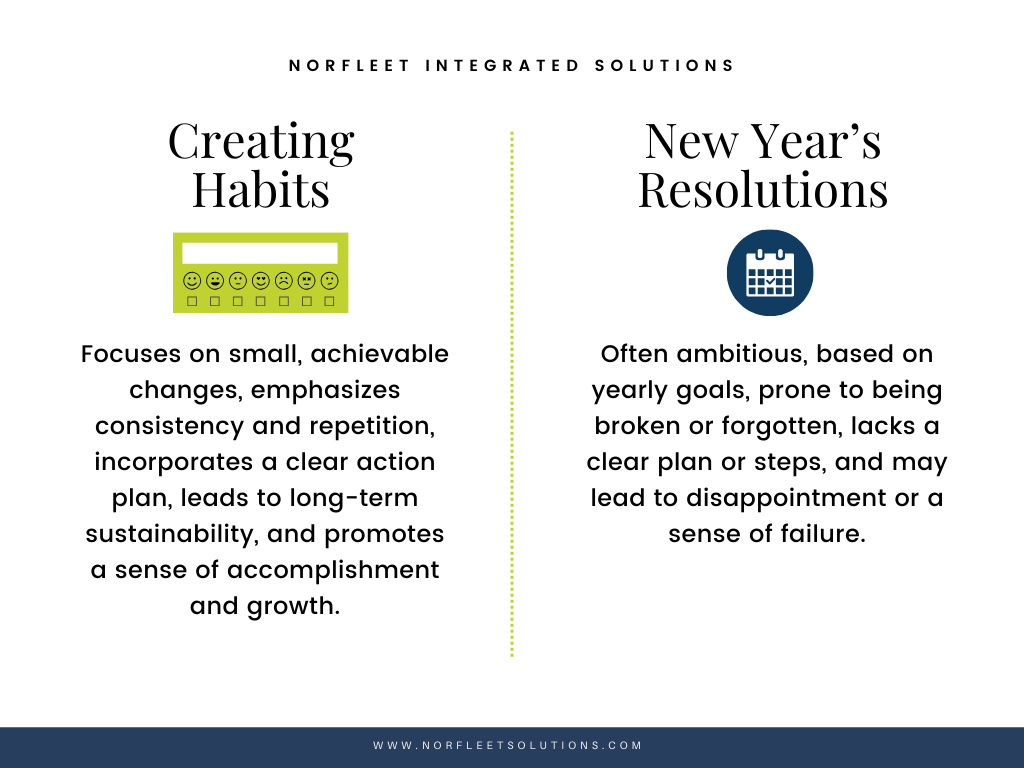The start of a new year is often an opportunity for introspection and self-improvement. Many people make New Year’s resolutions, hoping to make positive life changes. However, research shows that only a small percentage of people actually succeed in achieving their New Year resolutions. Creating habits, on the other hand, is a more effective way to make lasting changes in our lives. This article will explore the differences between creating habits and making New Year resolutions and why habits may be a better approach to personal growth and self-improvement.
New Year Resolutions: Why They Often Fall Short
New Year’s resolutions are promises we make to ourselves at the start of the year, intending to improve ourselves or our lives. Common resolutions include losing weight, quitting smoking, learning a new skill, or spending more time with friends and family. However, many people struggle to keep their resolutions beyond the first few weeks of the year. There are several reasons why New Year’s resolutions often fall short.
- New Year resolutions are often unrealistic or vague. For example, saying “I want to lose 20 pounds” without a clear action plan may be too ambitious or overwhelming. Similarly, vague resolutions like “I want to be happier” or “I want to be more successful” lack specificity and can be difficult to measure or achieve.
- Resolutions are often made without a clear understanding of the underlying habits that need to change. For example, losing weight may require changing eating habits or exercising regularly. Quitting smoking may require developing coping mechanisms for stress or finding alternative ways to relax. Achieving resolutions may be difficult without addressing the underlying habits contributing to a specific behavior.
- Resolutions often lack accountability or support. Many people make resolutions independently without involving others, making staying motivated or receiving feedback difficult. Additionally, resolutions are often made without a clear plan of action or timeline, making it easy to procrastinate or give up when faced with challenges or setbacks.

Creating Habits: A More Effective Approach
Creating habits is a more practical approach to personal growth and self-improvement. Habits are automatic and repetitive behaviors acquired through frequent repetition and ingrained in our daily lives. They are actions or routines we perform almost unconsciously, often triggered by specific cues or contexts. By intentionally cultivating positive habits, we can make lasting changes that support our well-being and contribute to personal growth.
Creating habits involves identifying the desired change, understanding the underlying habits that need change, and designing routines that lead to desirable rewards. For example, if the desired change is to exercise regularly, the underlying habit may be to wake up early or to find a workout partner. By intentionally designing a routine that includes waking up early, going to the gym, and rewarding oneself with a healthy breakfast, the habit of exercising regularly can be established over time.
Creating habits also involves accountability and support. We can stay motivated and receive feedback by involving others in the habit formation process, such as a workout partner or a coach. Additionally, tracking progress and celebrating small wins can provide a sense of accomplishment and reinforce the habit.
The Benefits of Creating Habits
Habits are significant in our lives, influencing our behaviors, actions, and overall trajectory. They are the building blocks of our daily routines, providing structure and stability. Creating habits has several benefits over making New Year resolutions.
- Creating habits is a more realistic and achievable approach to personal growth. By breaking down larger goals into smaller, manageable tasks, we can progress toward our objectives without feeling overwhelmed or discouraged.
- Creating habits is a more sustainable approach to personal growth. Once a habit is established, it becomes automatic and less reliant on conscious decision-making. Habits conserve mental energy and make it easier to navigate familiar situations. Additionally, positive habits can reduce stress levels, increase happiness, and improve overall well-being.
- Creating habits is a more empowering approach to personal growth. By intentionally designing routines that lead to desirable rewards, we can take ownership of our lives and become the architects of our well-being. Rather than relying on external factors or circumstances to dictate our lives, we can cultivate the habits that support our personal growth and self-improvement.
Creating Lasting Change
Creating lasting change with habits requires a thoughtful and intentional approach. Here are some steps to help you establish habits that stand the test of time:
- Identify the desired change
- Start creating small, manageable habits
- Understand and identify cues that prompt the desired change
- Design a supportive environment
- Be consistent with change; repetition is crucial
- Track your progress to stay motivated
Regularly Reflect on Your Habits and Their Impact on Your Life
In conclusion, creating habits is a more effective and sustainable approach to personal growth and self-improvement than making New Year resolutions. By intentionally cultivating positive habits and involving others in the process, we can make lasting changes that support our well-being and contribute to personal growth. So, instead of making lofty resolutions this year, consider creating habits that support your growth and empower you to become the best version of yourself.





0 Comments